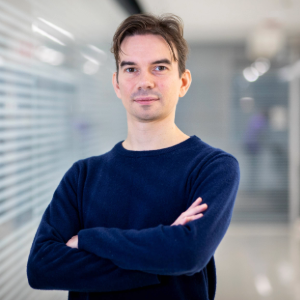
December 2024 Newsletter

December 2024 Newsletter

Student Profile
Nikolay Markov is a PhD candidate in the Driskill Graduate Program. His passion for science was first ignited in high school, which led him to pursue software engineering. Now, under the mentorship of Alexander Misharin, MD, PhD, and Scott Budinger, MD, Markov uses his skills to glean insights from large medical datasets.
Where is your hometown?
I was born in Moscow, USSR, which became Moscow, Russia as I was growing up. Now, after the country is transformed yet again, I am happy to feel at home here in Chicago.
What sparked your interest in science or medicine?
It's probably more useful to think about it as feeding a fire: every once in a while, you want to add a new log to it. At first, in high school, I got a glimpse of understanding of what is happening inside every cell on a molecular level—it was mind-blowing. Later, as I was in the software engineering world and not in science, I learned about short-read sequencing, metagenomics and how it is used in pathogen monitoring. I realized that biology grew a data-driven hall, and that I want to get into this hall.
What are your research interests?
I am interested in learning how to get the most out of big biological and medical data. It is possible to discover patterns, associations and hypotheses of causality by integrating different experimental and observational points of view of the same underlying processes, for the practical benefit of the patients. I think this involves not only keeping pace with the ever-accelerating field of machine learning, but, critically, using the expertise in cell biology, immunology, physiology, histology and many other relevant domains to make the machine learn what is useful, plausible, applicable.
What are you currently working on?
My current project is the analysis of the host response in the lungs during severe pneumonia, with two main questions: what are the pathogen-specific immune cell responses in the lungs, and how they depend on the pathogens, and if transcriptional profiles of lung cells can help us stratify patients by the risk of ventilator-associated pneumonia, a common complication of prolonged mechanical ventilation. I am working on this along with a big interdisciplinary team as part of the SCRIPT Systems Biology Center at Northwestern.
Please tell us about a defining moment in your education at Feinberg thus far.
Near the end of the pandemic, I shadowed one of our ICU physicians in the Division of Pulmonary and Critical Care medicine into the daily rounds and a bronchoalveolar lavage procedure. Being able to see where and how the data that I work with is being produced, and where the results should eventually return, changed the way I see research questions, and my daily research work itself.
Of course, Feinberg is huge and has so many opportunities, insights and talent. One of my favorite educational experiences was to be part of a multidisciplinary team, observe and learn the perspectives of different team members (physicians, clinicians, biologists, geneticists, experimentalists and so on), and what is shaping those perspectives. Being able to understand, talk and translate between these perspectives is an integral part of modern science.
What do you hope to do with your degree?
I hope to follow my research interests in a practical way. I also hope to contribute to science education, as its role is getting more and more important.